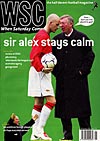 Tom Davies pays tribute to an enigmatic midfielder whose sudden departure proved symbolic for Leyton Orient and, perhaps, the whole of English football
Tom Davies pays tribute to an enigmatic midfielder whose sudden departure proved symbolic for Leyton Orient and, perhaps, the whole of English football
If I were to say that the past ten years in English football have seen the forces of righteousness take a bit of a drubbing while all manner of charlatans have prospered, I’d hardly win any prizes for originality. But when exactly did the rot start? The answer is simple: on December 28, 1991 when Leyton Orient played Brentford in the old Third Division.
Orient won a stirring encounter 4-2, but the game’s lasting talking point was the late dismissal of O’s midfielder Kenny Achampong for being repeatedly assaulted by a succession of visiting players in the course of a characteristically mesmerising run. The attention-seeker responsible for this atrocious decision was one David Elleray, who, we all agreed, would soon be rumbled and forced to eke out his footballing days running the line on Hackney Marshes. Kenny, though, was confirmed in our eyes as a God, a wronged hero, a man punished for his glorious, unpredictable art. It galvanised his form and, we assumed, his career.
Yet two and a half years later, Elleray was taking charge of the FA Cup final, while Kenny had disappeared without trace. He departed Brisbane Road in 1993, frozen out by manager Peter Eustace, with whom relations had always been frosty, although Eustace had been responsible for signing him from Charlton in 1990.
We’d heard of Achampong, of course, but knew little about him. A 1985 programme profile during his Fulham days tells us he was “a bit flash” and had an eye for the ladies, with a taste for “blondes, like Lucy in Dallas”, but rather less about just what a fabulous player he could be to watch.
One of Kenny’s favourite tricks was to pick up the ball on the right, control it, beat one (or two) defenders, look up, and then beat the same defenders again, for a laugh. Sometimes he’d even find time to fall over his own feet in the process. OK, so he often did this rather than the obvious – such as shoot – but he also had a glorious array of back-heels, space-creating flicks, knock-downs and crosses, and played a thrilling role in Orient’s credible attempts to get into the First Division in 1992 and 1993.
We loved him for his flaws, too. He was the kind of player who makes watching lower division football worthwhile, one whose inconsistency and unpredictability ensured few bigger clubs would be interested. Your Jermain Defoes, Neil Lennons and Laurie Cunninghams are and were all too unproblematically good to stay at small clubs. Kenny, though, was there to entertain us, not to fulfil a role in a production line for a richer club’s benefit.
And he cared. He used to turn up on his own to watch the reserves, he would come into the supporters’ club after games and chat to fans, and not just in platitudes; he had interesting and opinionated things to say, about tactics, about team selections, about the British game as a whole. At a club which so meekly accepts its underachieving place in the scheme of things, his arrogance was refreshing.
He was useful enough, too, to earn a call-up to the Ghana squad early in 1993, yet indifferent enough, seemingly, to vanish off the face of the earth a year later. As Orient’s promotion bid unravelled, Kenny fell out of favour. He was released in the summer of 1993, no one came in for him and he left the country. It was as if, irked by the failure of others to appreciate him, he’d decided he had better things to do with his life.
Later that autumn, he was sighted training with Marseille alongside his Ghanaian team-mate Abedi Pele. But a couple of years later, the former Orient captain, Terry Howard, told me that neither he, nor any of his old team-mates, had a clue about his whereabouts. Kenny had wanted to be alone, and no one had kept in touch.
All that can be discerned is that he went back to play in Ghana for a while, moved to Germany in 1998 and was last reported to be “living in north London” last year, which is as mundane a thing as anyone could say about such a glorious talent. But over in east London, eight mostly miserable years on from his departure, his triangular haircut and circular dribbling would be a welcome sight, even now. Just as welcome in fact as the spectre of David Elleray, over the marshes, being hassled and humiliated by a bunch of Sunday morning cloggers. That neither is going to happen is irrefutable proof that we live in a truly dysfunctional world.
From WSC 179 January 2002. What was happening this month